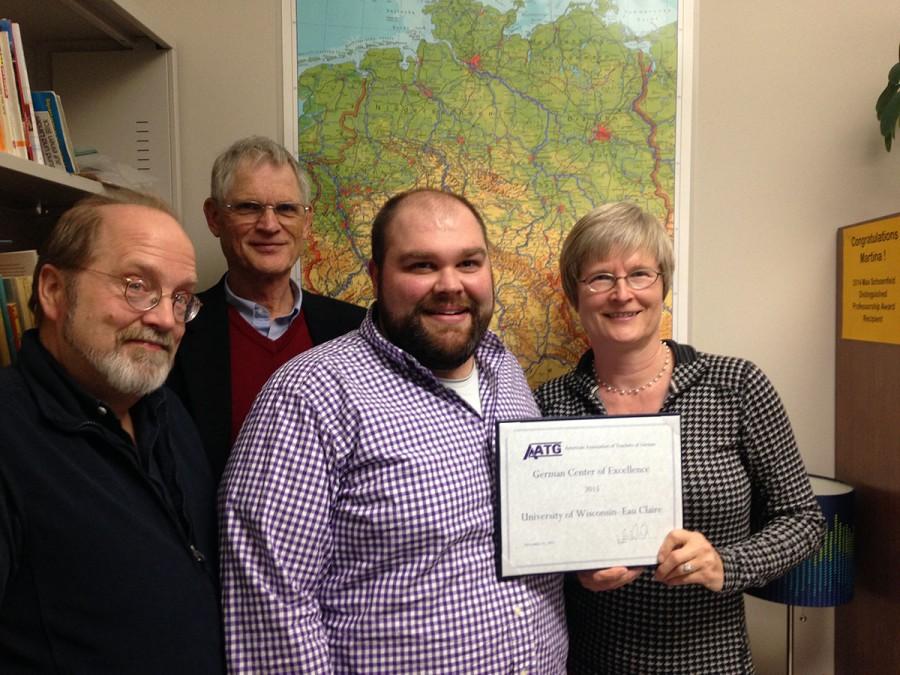Language program designated as “Center of Excellence”
German program becomes first Wisconsin post-secondary institution to join ranks
More stories from Lauren French
Photo by Lauren French
Jefford Vahlbusch, Johannes Stroschänk, Josh Brown and Martina Lindseth present the Center of Excellence designation awarded to the UW-Eau Claire German program this year. Lindseth and Brown received the award Nov. 21 in San Diego, California, at the American Council on the Teaching of Foreign Languages Annual Convention and World Languages Expo.
A prestigious award recently granted to the UW-Eau Claire German program has its roots in a curricular change two decades ago.
In the 1990s the university’s German program introduced a professional communication track to its curriculum. The addition marked an important turning point for the program.
German professor Johannes Strohschänk said this ultimately lead to its garnering of a Center of Excellence designation from the American Association of Teachers of German.
Strohschänk said the addition of a professional communication program started the program’s shift from literary learning to practical proficiency, or how well students are able to use their speaking skills.
Strohschänk, along with German professors Martina Lindseth and Jefford Vahlbusch and assistant professor Josh Brown received notice of the award on Oct. 13. Lindseth and Brown accepted the award Nov. 21 at the American Council on the Teaching of Foreign Languages Annual Convention and World Languages Expo in San Diego.
“We couldn’t go anywhere (at the convention) without somebody asking us about (the award),” Lindseth said. “The visibility of Eau Claire and our program in particular is just amazing on the national level.”
Since the award’s origin in 2012, six post-secondary institutions have received a Center of Excellence title: the University of Arizona, Michigan State University, Middlebury College, Western Washington University, Emory University and Valparaiso University.
UW-Eau Claire joined that group as the first ever post-secondary Wisconsin program and the only post-secondary institution chosen this year for that designation.
Part of the application process included statements of support from colleagues, alumni, students and other German programs nationwide. AATG jurors wrote that UW-Eau Claire’s German program was “excellent in every category.”
Strohschänk said the award’s national recognition could attract new hires and students from beyond the regional area.
“The fact that this is broadcast widely will echo with the parents of students who may have a say in what college they want to send their children,” Strohschänk said. “… It reverberates from many corners.”
A curriculum revamp in 2011 added increased focus on practical proficiency, Lindseth said. The German program used a backward design approach to its courses, with professors taking national guidelines and standards already available and designing their courses to fall within those standards, she said.
“It was a risky move because we didn’t change one course,” Lindseth said. “We changed everything. It paid off because … we pretty much grew over 50 percent.”
The number of German majors and minors at the university increased from 66 in 2011 to 97 currently.
Soon after the 2011 curriculum alterations, the program changed its study abroad program to encourage students to use more of their language skills. Brown said students were consistently reporting they didn’t interact much with native Germans because they lived and took classes with other international students.
To counteract this, Brown said students are now required to complete certain “tasks” while on their study abroad trip, ranging from asking for directions in German to talking to a native about a political controversy.
UW-Eau Claire senior geography major and German minor Laura Hartley studied abroad in Marburg, Germany, last spring. She said interacting with Germans boosted her comfort level with the language.
“I wouldn’t have (gone out of my way) in the first place,” Hartley said. “By forcing you to go talk to (Germans), it really helps.”
Brown said the next step for UW-Eau Claire’s German program is to emphasize what it does well to attract more students and faculty. He said the program’s courses are dually focused on language and making students think about international issues of power, social justice, ethics and citizenship.
“I think that when people come to a foreign language classroom, they’re just expecting the language,” Brown said. “I think our next job is to show that’s not just what we do.”

